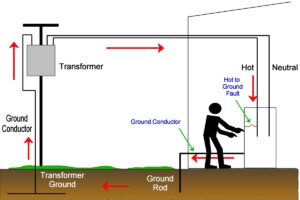A ground wire, also known as a grounding conductor, is a vital safety feature in any electrical system. Its primary purpose is to provide a safe path for excess electrical current to flow into the earth (the 'ground') during a fault, such as a short circuit, surge, or lightning strike.

what does ground wire do
🔒 Why Is the Ground Wire Important?
The ground wire protects people, appliances, and property in the following ways:
Prevents Electric Shock
If a live wire accidentally touches a metal part of an appliance, the ground wire ensures the electricity flows safely into the earth — instead of through your body.Helps Trip Breakers Quickly
By providing a low-resistance path, it allows a large surge of current to flow, which quickly trips the breaker or blows a fuse, cutting off power before harm can occur.Protects Equipment
Sensitive electronics like computers, TVs, or HVAC systems are vulnerable to power surges. Grounding helps divert harmful voltages away from your devices.
⚙️ How Does a Ground Wire Work?
Here’s a simplified step-by-step:
Normal Conditions: The ground wire carries no current during regular operation.
Fault Occurs: A live wire contacts a metal surface or there's a surge.
Current Rerouted: The ground wire provides a direct path to earth.
Breaker Triggers: The sudden flow of current causes the breaker to trip or fuse to blow.
Power Cut: The circuit shuts off, preventing shock, fire, or damage.
🔌 Where Can You Find a Ground Wire?
Electrical outlets (especially 3-prong types)
Circuit breaker panels
Power cords of grounded appliances
Metal conduits or enclosures
Ground rods connected outside a home or building
Color: In most systems, the ground wire is either green, green with yellow stripes, or bare copper.
🆚 Ground Wire vs. Neutral Wire
| Feature | Ground Wire | Neutral Wire |
|---|---|---|
| Purpose | Safety path for faults | Returns current to source |
| Carries Current | Only during faults | During normal operation |
| Color Code | Green / bare | White / gray |
| Required? | Yes, in grounded systems | Yes |
🛠️ Example: Why Grounding Matters
Imagine a refrigerator has a short where a live wire touches the metal frame. If the appliance is properly grounded:
The electricity flows through the ground wire, not the metal frame.
The breaker trips immediately.
You can touch the fridge without danger.
If it wasn’t grounded, that metal frame could remain live with dangerous voltage — and become lethal.
📏 What the Codes Say
Grounding is not optional — it’s required by safety standards like:
NEC (National Electrical Code) in the U.S.
IEC 60364 internationally
BS 7671 in the UK
These codes define how ground wires should be installed and what materials can be used.
✅ In Summary
The ground wire is a silent protector — it doesn’t carry power during normal use, but when something goes wrong, it’s the key to preventing injury, fire, or damage. Whether in a home, office, or industrial setting, a proper grounding system is essential for safety.





